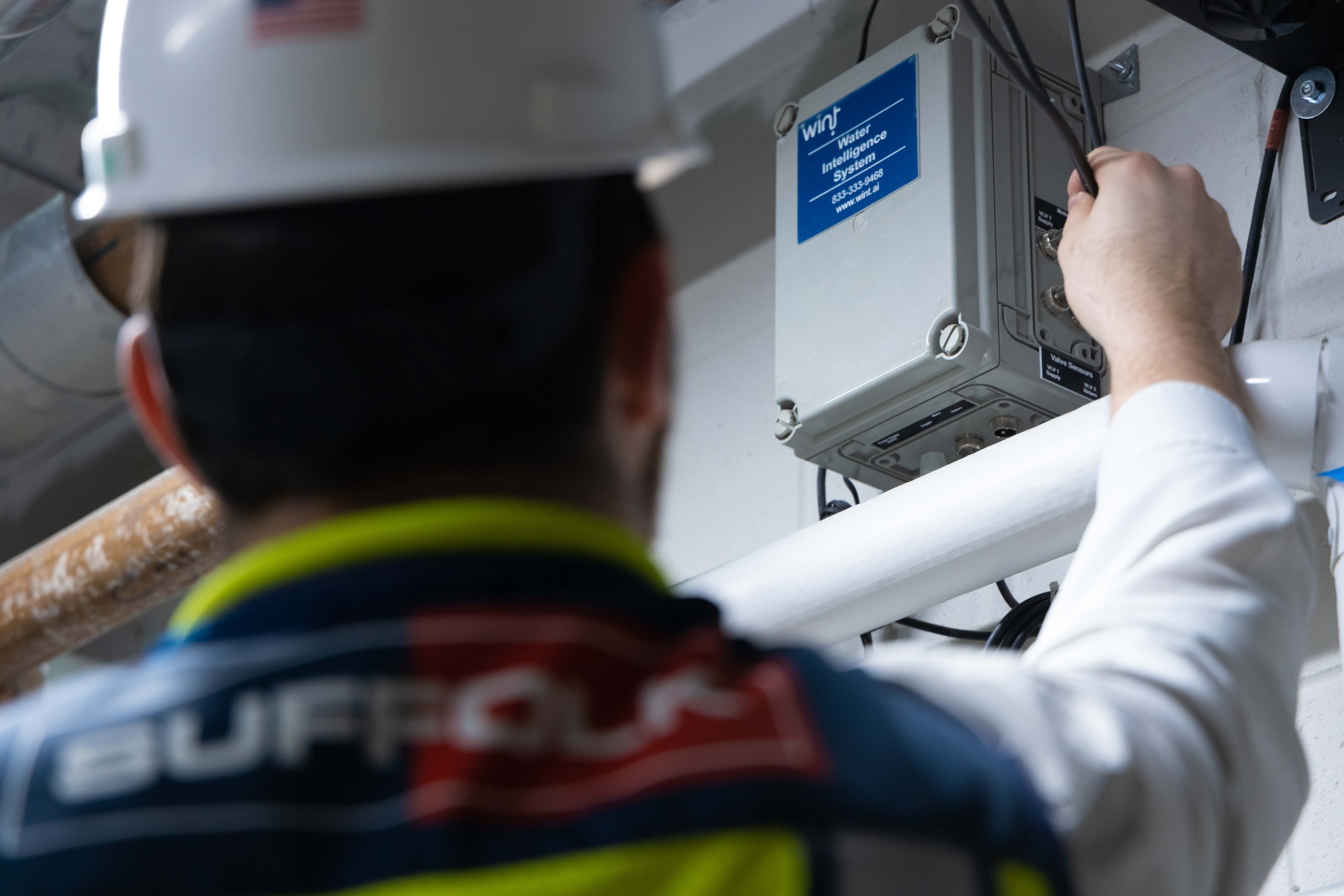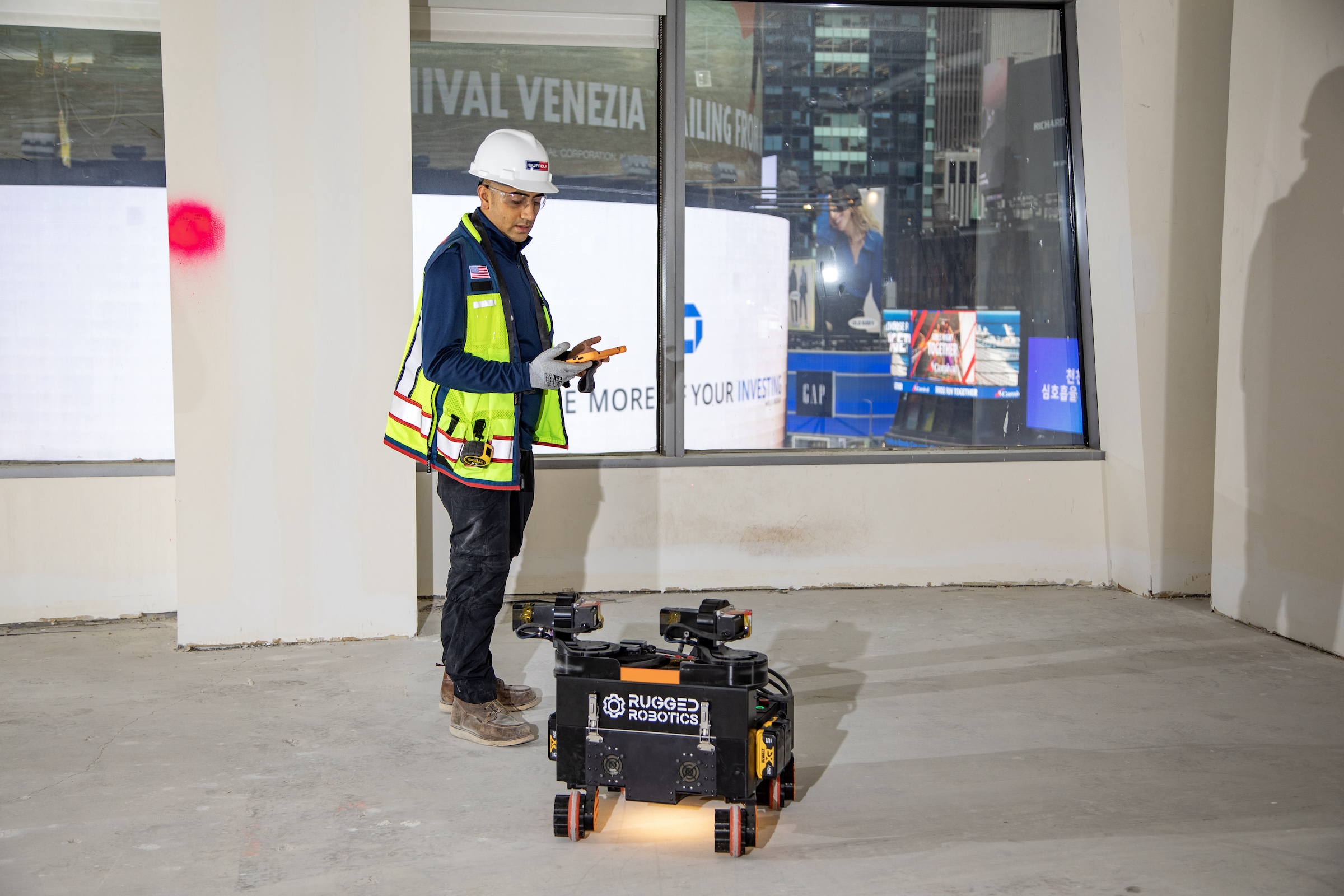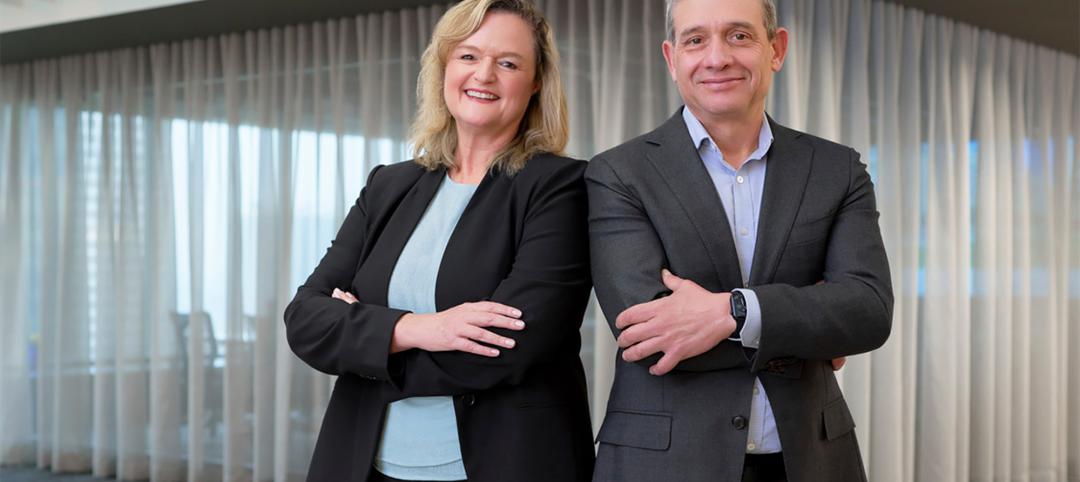In July 2023, Suffolk Technologies stated that it had raised $110 million in commitments to its inaugural Fund, which this institutional venture capital firm, affiliated with the general contractor giant Suffolk, is using to invest in early-to-growth-stage ConTech and PropTech companies.
Parker Mundt, Suffolk Technologies’ Vice President–Platforms, recently spoke with Building Design+Construction about his company’s investment strategy. (The following Q&A has been edited for length and clarity.)
How many companies has Suffolk Technologies invested in so far?
Since we launched the fund, we’ve invested in 27 companies; 13 are in our core portfolio and there’s another 14 through our BOOST accelerator program.
How do you find these companies and go about bringing them into the fold?
By way of background, Suffolk Technologies started as more of a corporate venture capital fund in 2019 and then we raised external capital. The impetus behind starting Suffolk Technologies was we saw a huge wave of innovation and change coming to the construction industry, a lot of which stemmed from the more-daring startup community.
If you looked at productivity for the past 100 years across all industries, construction brings up the rear along with agriculture. Having said that, there was innovation coming from the startup community. We were seeing a lot of early-stage startups from the likes of MIT, Harvard, and the Stanford GSB program, with audacious, high-reaching goals. Suffolk’s Chairman and CEO John Fish saw opportunity and decided to think differently.
Newmetrix was one of the first companies we rolled out [in 2018] to utilize artificial intelligence, computer vision, and machine learning on our jobsites. By leveraging historical data, Newmetrix allows us to predict safety incidents before they happen on jobsites, so we can mobilize our teams and take action to minimize risk.
When we made a few more investments, they were coming from Fish’s Family Office money, with a high level of rigor and with high aspirations to one day spin out and have our own standalone institutional-grade venture fund.

Fast forward to 2022: we went out to market to raise our first Suffolk Technologies Fund. We have been investing out of that fund for over a year. It has a good mix of 25 financial and strategic investors, of whom John Fish is one. We are a standalone institutional-grade venture capital fund that has deep strategic ties to Suffolk and other industry partners.
Can you explain your ConTech and PropTech investment process?
We use Suffolk’s jobsites as kind of our barometer for new technologies that they might be using. We have more than 100 active construction projects across the country. We also work with 10,000 trade partners across the country, as well as 700 developers and 500 architects and engineers. Through that network, we are made aware of or start to use innovative software or hardware, and they now know to pass that [information] over to Suffolk Technologies … which has the innate and often unique ability to add tremendous value to early-stage technology companies.
We’re also very active on LinkedIn and host events quarterly at Suffolk’s headquarters that are run by Suffolk Technologies, where we focus on specific themes [like robotics and sustainability]. We are becoming the convener and one of the primary voices of innovation and change in our industry.
As a result, a lot of generalist investors come to us to help them complete their diligence on a company they might be looking to invest in. We are also brought to the table and used as a diligence partner for other investors, which brings more deal flow to us as well.
We do something very similar with BOOST, our accelerator program. We market it as a “sprint” program, so BOOST only runs each fall for six weeks. BOOST is designed for us to have a curated methodology for bringing in early-stage construction technology companies.
Ninety-five percent of the companies that applied to the program last year are pre-Series A, which means the company might have two to 10 employees. They usually have a product or an idea for a product, and they’re looking for strategic help.
Applicants must state what business challenge they want to solve with Suffolk Technologies. We’re very focused on how we can help these companies and make sure we can deliver on the value that we’re promising them.
We utilize BOOST to get us in with some early-stage companies that are telling us where the industry may be headed.
Have you had occasion where the companies you choose for the BOOST program evolve into larger investment candidates?
Yeah, you nailed it. We look at every single company that comes through our BOOST program for that opportunity.
We had 212 companies from over 27 countries apply to be in our program last year. That’s about a 100% increase in the applicant pool in just three or four years. It’s getting more legs in the market. And we typically have the opportunity to invest a larger check into those companies.
Can you give me a broad definition of innovation from Suffolk’s standpoint?
Innovation is defined as changing longstanding processes and methodologies that have been used in the construction industries for centuries in search of safer, more predictable, maybe more profitable, faster and better outcomes. That means we look at different business models. We look at standing up different businesses that might sit adjacent to Suffolk as a general contractor.
We made a pledge to the industry six years ago that our ability to synthesize, understand, and aggregate data across our jobsites was going to drive innovation.
You can’t manage what you cannot measure. If we don’t have standardized baselines, measurements, and metrics of what a successful project means and include all things pertaining to safety, to cash flow, to scheduling, to owner sentiment, to quality of the building, then how are we going to change that?
Suffolk Design, which started as a constructability review team, evolved to be a true design-build firm, and has the capabilities to … flush out potential constructability issues that might arise during construction.
We want to build faster, design faster with fewer errors and rework, which is ultimately leading to a project that has lower cost overruns, lower safety incidents, and finishes on schedule.
When you’re looking to invest in ConTech startups, what are your risk parameters?
From Suffolk Technologies’ perspective, we’re looking for the groundbreakers. We’re backing companies and ultimately founders who are visionary, and willing to create new markets or enter uncharted territory. We are in the game of calculated risk taking; venture capital is built on that.
[Companies that address] preexisting market dynamics can more easily be plugged into the Suffolk construction ecosystem because they’re already solving a problem as opposed to being in a super early stage where that market might need to grow for a couple of years. So depending on what stage the company is at and what they’re trying to accomplish, we curate and then help them in unique, different ways.
It’s kind of like “choose your adventure.“
I’m interested in how the BOOST program pairs startups with industry and venture capital experts.
We launched the BOOST program three years ago, during the height of Covid-19. We were one of two partners involved in the program. The impetus and goal behind BOOST are to move the industry forward. Over the last three years, we’ve added what we call operating partners. We now have 22 operating partners who help us run the program and select the companies that come through the program.
[Holcim, one of the largest producers of aggregates] has been a BOOST partner for a couple of years, and we ask them to work with some of our BOOST companies every year. Holcim has been a super valuable partner to one company looking to bring visibility into the supply chain. It’s also worked with a Germany-based company that’s looking to make Environmental Product Declaration creation easier for material suppliers.

This year we’ve added five general contractors to be partners in the BOOST program. These GCs work in different markets and build different asset types. [So the BOOST candidates] get a point of view from a Canadian general contractor and another from Dubai and a GC from Salt Lake City that builds multifamily and one from Washington State.
How does Suffolk Technologies measure success with ConTech investments?
We look at how quickly we can help companies find product-market fits, how fast can we get their product to market, and how we can help them refine their market strategy.
We catch on to these companies right when they’re about to hit that inflection point, and we help them power through it to get them to that next step on their journey as fast as possible. In the past three years (not including BOOST 4, which is happening now), we’ve put 18 companies through the program and after graduating, they went on to raise over $375 million of venture capital funding.
There are other firms in the industry that have venture capital platforms. Is there something about Suffolk Technologies that attracts these companies beyond the money factor?
Suffolk Technologies has a unique ability to validate and test new technologies coming into our industry.
[Mundt pointed specifically to Open Space, a 360-degree camera that can be attached to hardhats to capture still and video images of jobsites.] We tested them on three projects, then made an investment and rolled them out over two years to 40 projects.
So the process would be, after you’ve established that it’s a viable product and then it’s tested, you would roll it out first within your company and then to the larger universe.
Exactly. We can benefit from some of these tech tools when we tie in the developer, the architect and the engineer, we tie in our team and our subcontractors, and everyone’s utilizing the same information to make the right decisions on the job site. That’s where we really start to see some of this time and cost savings.
What happens when a ConTech investment isn’t paying off as planned?
We don’t put a time limit or a cap on how long it might take for a company to start generating revenue. When Suffolk Technologies makes an investment, it’s starting a partnership.
So if something’s not working in their product, that doesn’t mean we stop helping them. If they haven’t been able to generate revenue, it doesn't mean we give up on them. It actually means we lean into it, because we believe in what their vision is and we believe in that founder and it would be absolutely against our DNA to give up on anybody who’s trying to help us change the industry.
Related Stories
Cladding and Facade Systems | Apr 5, 2023
Façade innovation: University of Stuttgart tests a ‘saturated building skin’ for lessening heat islands
HydroSKIN is a façade made with textiles that stores rainwater and uses it later to cool hot building exteriors. The façade innovation consists of an external, multilayered 3D textile that acts as a water collector and evaporator.
Women in Design+Construction | Apr 5, 2023
Carole Wedge, former Shepley Bulfinch President and CEO, retires after 37 years
Wedge’s 37-year career at Shepley Bulfinch evolved a historic firm into a national design practice.
AEC Innovators | Mar 27, 2023
Leading architecture, engineering firm HED appoints new co-CEOs
As children of immigrant families, Van Herle and Suarez will bring a diverse perspective into a historically underrepresented industry and advance the firm’s mission of creating a positive impact for clients, communities, and the world.
Transportation & Parking Facilities | Mar 23, 2023
Amsterdam debuts underwater bicycle parking facility that can accommodate over 4,000 bikes
In February, Amsterdam saw the opening of a new underwater bicycle parking facility. Located in the heart of the city—next to Amsterdam Central Station and under the river IJ (Amsterdam’s waterfront)—the facility, dubbed IJboulevard, has parking spots for over 4,000 bicycles, freeing up space on the street.
Building Tech | Mar 14, 2023
Reaping the benefits of offsite construction, with ICC's Ryan Colker
Ryan Colker, VP of Innovation at the International Code Council, discusses how municipal regulations and inspections are keeping up with the expansion of off-site manufacturing for commercial construction. Colker speaks with BD+C's John Caulfield.
AEC Innovators | Mar 3, 2023
Meet BD+C's 2023 AEC Innovators
More than ever, AEC firms and their suppliers are wedding innovation with corporate responsibility. How they are addressing climate change usually gets the headlines. But as the following articles in our AEC Innovators package chronicle, companies are attempting to make an impact as well on the integrity of their supply chains, the reduction of construction waste, and answering calls for more affordable housing and homeless shelters. As often as not, these companies are partnering with municipalities and nonprofit interest groups to help guide their production.
Modular Building | Mar 3, 2023
Pallet Shelter is fighting homelessness, one person and modular pod at a time
Everett, Wash.-based Pallet Inc. helped the City of Burlington, Vt., turn a municipal parking lot into an emergency shelter community, complete with 30 modular “sleeping cabins” for the homeless.
AEC Innovators | Mar 2, 2023
Turner Construction extends its ESG commitment to thwarting forced labor in its supply chain
Turner Construction joins a growing AEC industry movement, inspired by the Design for Freedom initiative, to eliminate forced labor and child labor from the production and distribution of building products.
Multifamily Housing | Mar 1, 2023
Multifamily construction startup Cassette takes a different approach to modular building
Prefabricated modular design and construction have made notable inroads into such sectors as industrial, residential, hospitality and, more recently, office and healthcare. But Dafna Kaplan thinks that what’s held back the modular building industry from even greater market penetration has been suppliers’ insistence that they do everything: design, manufacture, logistics, land prep, assembly, even onsite construction. Kaplan is CEO and Founder of Cassette, a Los Angeles-based modular building startup.
AEC Innovators | Feb 28, 2023
Meet the 'urban miner' who is rethinking how we deconstruct and reuse buildings
New Horizon Urban Mining, a demolition firm in the Netherlands, has hitched its business model to construction materials recycling. It's plan: deconstruct buildings and infrastructure and sell the building products for reuse in new construction. New Horizon and its Founder Michel Baars have been named 2023 AEC Innovators by Building Design+Construction editors.

















